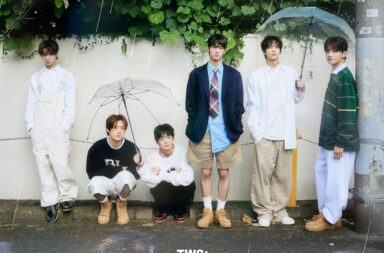In the first part of the End-of-Year music discussion, Lo and Victoria walked us through the mini albums that stood out to them. They move on to full albums in this post, sharing the works that took creative risks and dive into difficult topics like mental health struggles and avoidance.
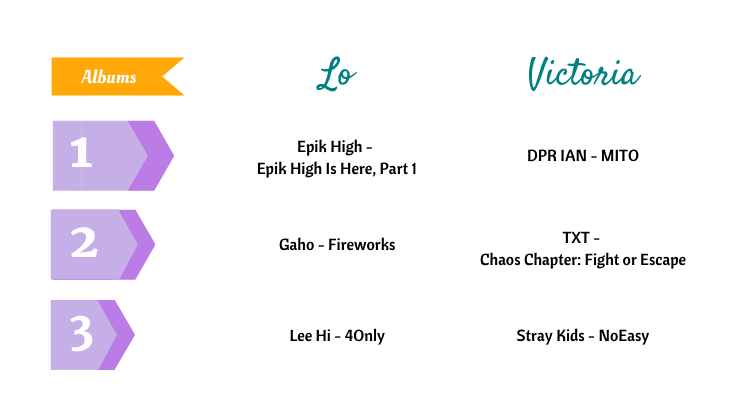
Lo: But you had your own pop-leaning pick, over in the full-length albums. TXT has never quite cracked my shell, especially given my ever-growing annoyance at multi-part album sagas. What spoke to you in Chaos Chapter: Fight or Escape?
Victoria: This year TXT’s music really went from fantasy-esque vagueness to pop punk smut, and I’m here for it. I’m not sure if there is something in the water at HYBE or the sounds of my teenage years are just in vogue, but I loved both the Chaos Chapter installments.

The dip towards angsty teen pop and emo-core/punk in these albums I find both ironic for the group as well as highly satisfying. The members of TXT are young: the oldest, Yeonjun, being the only one even both before 2000. Punk is never dead (long live), but its heyday in the times of Warped Tour and the resurgence of popularity in the late ‘90s and early 2000s is more than twenty years away by now. It is also now seeing a new revival in Gen-Z artists like Olivia Rodrigo, Willow Smith, Xdinary Heroes and Se So Neon.
With that being said, this sound and TXT’s albums this year manage to scratch a nostalgic itch for everyone who did grow up with an emo phase in the early 2000s and 2010s (cough cough). The repackage album Fight or Escape has all the same songs as Freeze plus “LO$ER=LO♡ER,” “MOA Diary (Dubaddu Wari Wari),” and an emo-core mix of “0X1=LOVESONG.”
The whole track list is good, but “LO$ER=LO♡ER” and “Anti-Romantic” have my whole heart, even now. The first, “LO$ER=LO♡ER” is a big “f**k you” to haters while delighting in the fact that sometimes everyone might feel or be perceived as a loser. The former, “Anti-Romantic” is an apologetic anti-love song that expresses a numbness to pain as a result of heartbreak and loneliness.
The Chaos Chapter: Fight or Escape’s take on nostalgia, hopeless romanticism, and shared suffering keeps this album in my rotation, even now. I sorely hope Txt’s punk legs are here to stay, because, wow, it suits them while also normalizing the revival of pop punk and metal (broadly defined) in the mainstream.
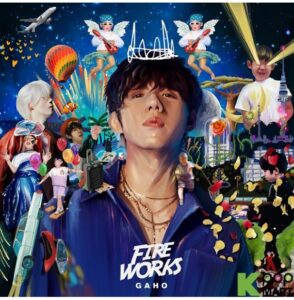
Speaking of angst, I’d love to hear your thoughts on Gaho’s Fireworks. It’s one of the newers picks on this list, but has some true home runs and variety thanks to Gaho’s power vocals. What did you like most about it?
Lo: Fireworks is the other album where I related heavily to the unhealthy coping mechanism at its core. Fireworks is an ode to avoidance and endurance. The entire first half of the album is Gaho trying to outrun his issues. Imposter syndrome, anxiety, and self-doubt, though, are part of you, so no matter how hard he tries, Gaho cannot get away from them. And eventually, he accepts that and turns to his other unhealthy coping mechanism: endurance.
The thing that truly sticks out about Gaho’s gritting his teeth and insisting everything is fine is that it’s hard to call him wrong. Sometimes, there aren’t better solutions than just getting through a difficult time. Some of it is self-inflicted, to be sure– downplaying his own wants in a relationship inevitably leads him to heartbreak– but it’s not like there’s a better way to cope with being dumped. But while piecemeal Gaho’s actions are understandable, the whole is a tragic tale of denial and misery buried under smiley face stickers, showing that he needs to change how he copes to actually resolve the elephant sitting on his chest.
The variety Gaho indulges in is just as impressive as his lyricism. Arena rock, mall punk, lounge music, power ballads; Gaho shows he can do it all. His voice has a richness and depth that really allows him to indulge that variety, with the constant shifting sound mirroring the swirling chaos of his mental landscape. The only element that is consistent across Fireworks is the burning energy that lies at the heart of each track. This is an album that fills you, makes you share in Gaho’s restlessness and need to flee, so even if you understand why his avoidance isn’t helpful, you completely comprehend how he got there.
Of course, you have your own rock-leaning pick, Stray Kids NoEasy, though they tend to lean a bit more broad than Gaho did. What impressed you about it?
Victoria: One of the things I love about Stray Kids is the evolution of their songwriting and the creative risks they take. Despite being only their second full length album, NoEasy continues a little bit of everything: rock, rap, unit songs, ballads, and storytelling in spades.
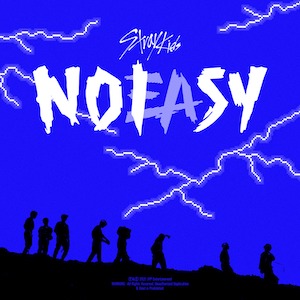
The wordplay NoEasy and the title track “Thunderous” build a story around noisy boys who tempt fate by fighting against elusive sound monsters threatening humanity as we know it. The title track is characteristically rambunctious and witty, but with a tinge of fantastical imagery and traditional instrumentation. The surrounding tracks are intense and rap-heavy while songs like “The View” and “Secrete Secret” urge listeners to let go and embrace the present. I’m especially fond of “Secret Secret” and Han’s motivation behind the song’s lyrics and message, as shared in the groups’ intro film.
Another feature of NoEasy is three unit songs created through their “SKZ SONG CAMP” series entitled “Howl in Harmony.” The first three episodes feature a different unit and their song creation process while the last two feature each group sharing their songs and subsequent reactions. The melodrama and humor aside, all the members baring their creative songwriting sides scratches a creative itch that few groups can. Each unit song is wildly different in style, content, and sound and holds the musical imprint of the members that created it. I’m evenly torn between the breathtaking beautiful “Gone Away” and spicy “Red Lights” for my favorite between the unit songs.
Stray Kids always seem to put a piece of themselves in all the music that they write, especially 3Racha, and I think NoEasy was one of their most creative, diverse, and mature releases to date.
Speaking of creativity and agency, I’d love to hear you talk about Lee Hi’s 4 Only more. I’ve enjoyed getting to know it more since you picked it!
Lo: Obviously, the first point in 4 Only’s favor is Lee Hi’s stunning voice. Her voice has power, but more importantly, it has color. Her voice is inherently distinctive, with few flourishes required to make it hit hard, and 4 Only takes full advantage. It leans into jazz and soul; genres that play well with simpler construction and heavily emotive performances. Given that Lee Hi’s slightly-sandpapered vocals always sound like she’s two whiskeys and a crying jag into her feelings, it’s a great choice. The perpetual sense of heartbreak adds a lot of depth to an already-rich story.

That story is what really won me over. 4 Only traces a very neat, simple tale– girl meets boy, boy attempts to control her, girl dumps boy and goes out for a girls night where she meets someone new, girl struggles with her new relationship due to doubts and anxiety from her last one crashing and burning, but eventually works through it to find something stable. It’s just so healthy.
Infatuation is not equated with love. There’s a keen awareness of the difference between romance and a long-term relationship. Lee Hi understands that her issues are her problem, and works through them rather than projecting them onto her partner. Most of all, 4 Only endorses having high standards. So often, women with high standards are treated as picky or demanding, and are told that being treated badly is better than being alone. Lee Hi rejects that. When her man starts trying to dictate her interests and clothes while playing mind games, she ends it, which allows to find someone new who makes her feel safe and warm. High standards are what enable Lee Hi to find a better happiness.
Now for our top picks! While we both leaned into hip-hop, we went in wildly divergent directions. You turned to an underground artist who’s fighting his own mind. DPR Ian’s MITO: tell me more.
Victoria: Like I.M’s Duality, MITO is beautifully fervent, emotional, and sometimes unnerving in a way that makes you pay attention. But, rather than general nihilist or existentialist Gen-Z dread like I.M’s album, MITO is inspired by Christian (DPR Ian)’s struggles with bipolar disorder. The MVs and music are both raw, highlighting the stark contrast one can feel between manic and depressive episodes.
One of my favorite songs of the whole year is “So Beautiful.” Beginning with an opening narration about “before he changes again,” the MV depicts dual Ians, one shirtless and wandering aimlessly along a forgotten road, and another sinister and clothed in darkness. Both personas often appear disconcerted with their surroundings and respective sense of self, parallel to Ian’s reflections on how bipolar disorder can make him feel like “everything feels very unfamiliar.”
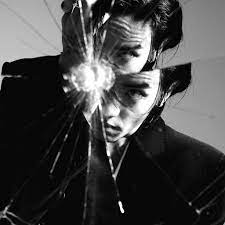
The seemingly conflicting intertwining of beauty and darkness makes for a deeply evocative and personal listening experience. I dont’ have bipolar disorder, but some of Ian’s lyrics and imagery evoke visceral, relatable feelings that remind one that sometimes it’s fine to be in pain and unfamiliar, even to ourselves. Maybe it’s just because I’m in the throes of my last semester of graduate school as a musician and never ending pandemic hell, but I find comfort in someone depicting real vulnerability and un-ok-ness packaged into such incredibly catchy, genre-blurring, and well-written music.
Speaking of, the motivations might be slightly different, but I think your pick in Epik High’s Epik High Is Here, Part 1 has that same retrospective rawness. What songs and stories stood out to you the most?
Lo: In an industry that’s all about the next big thing, Epik High’s greatest strength is their willingness to show their age. Their career is old enough to vote. Moreover, they sound like it. Epik High is Here, Part 1 sounds like three men who are exhausted because they have spent literal decades fighting the good fight and it’s still not enough.
They go after cancel culture and the holier-than-thou attitude that accompanies those who attack people for the slightest misstep, decry the youth splintering among themselves rather than focusing on true enemies, and question the foundations of any society that teaches obedience as its first lesson. Tablo and Mithra Jin also turn their bladed words inward, questioning their own distance from people, sanitisation of crime via screen, and participation in wealth inequality. And underscoring it all is the sparse but intense instrumentals of DJ Tukutz, sounding bone-tired but resilient, which is the entire point.

I often call Epik High the elder statesmen of Korean hip-hop, and it’s not for their longevity. It’s because twenty years after their debut, Epik High are still in the game, trying to change the world. It doesn’t matter if they’re tired, old men, watching or missing their children grow, disappointed with themselves and the world for not meeting their hopes for the future. Epik High is here, and will remain here until they are no longer needed.
2021 really saw the natural result of artists spending so much time inside: They have nothing to draw from but themselves, and thus their music is themselves laid bare, from demons to exhaustion to confidence.
Victoria: It seems 2021 was a year of veterans fighting the good fight and reimagining their musical identities and newbies testing musical boundaries of old. There was also an explosion of soloists and a trend toward the revival of punk pop and rock anthems, even from idols who were never alive during the genre’s heyday.
2021 also saw some of the most forthright reflections on mental health struggles and social issues like cancel culture and the ongoing COVID-19 pandemic around the world to date. Currently, things begin to open up in some places, close in others, and remain generally unpredictable. However, between remarkable industry veterans and innovative rookies, 2022 is set to be a promising new year of music.
(Images via HYBE, Planetarium Records, JYP Entertainment, AOMG, Dream Perfect Regime, William Morris Endevor, YouTube [1], [2], [3])


